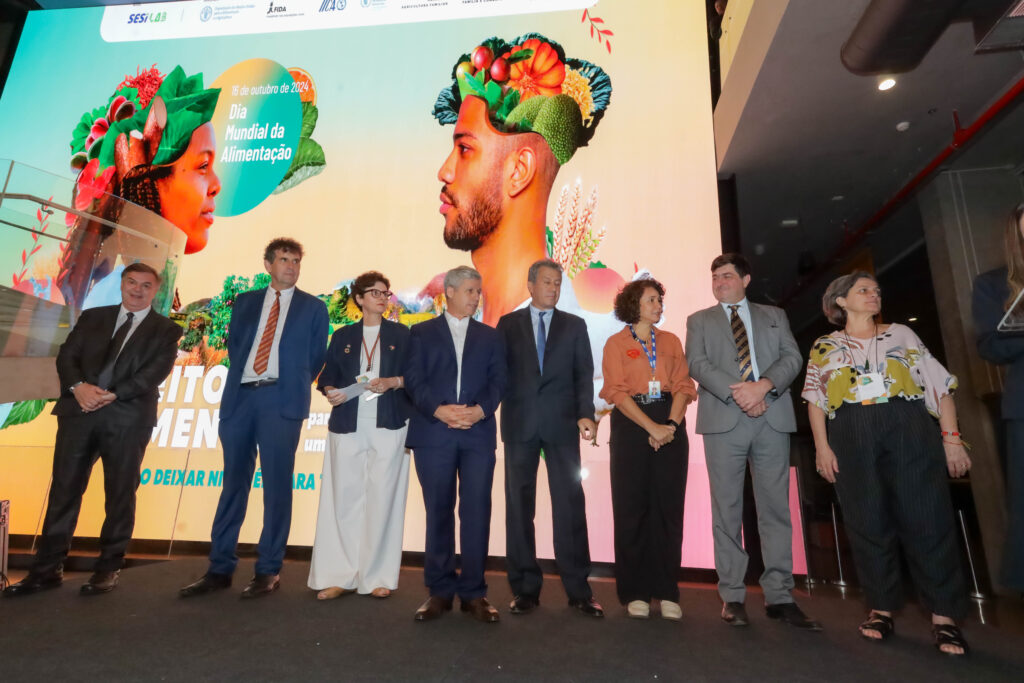
©Paulo Negreiros/IICA
World Food Day (WFD), on October 16, is a UN date celebrated in more than 170 countries with the aim of mobilizing joint efforts to fight hunger. In Brazil, authorities from international organizations and the federal government met at the Sesi Lab in Brasilia to reflect on the issue, highlighting Brazil’s trajectory and its role in food security around the world.
In 2024, the global movement around the WFD focused on the Right to Food for a Better Life and Future. The Director and Representative of the World Food Program (WFP) in Brazil, Daniel Balaban, recalled that the WFP allocates around US$ 7 billion a year to feed 170 million people in the world every day, but 733 million people still don’t have food. “The world produces enough to end hunger. But we need a collective effort from countries to change this reality,” he said.
The WFD celebration in Brasilia was jointly promoted by the Food and Agriculture Organization of the United Nations (FAO), the World Food Programme (WFP), the International Fund for Agricultural Development (IFAD) and the Inter-American Institute for Cooperation on Agriculture (IICA), in partnership with the Ministries of Development and Social Assistance, Family and Fight against Hunger (MDS) and Agrarian Development and Family Agriculture (MDA).
Authorities
During the ceremony, the Minister of Agrarian Development and Family Farming, Paulo Teixeira, emphasized Brazil’s progress in the fight against hunger and the country’s commitment to leave the FAO Hunger Map once again. He also highlighted the barriers to healthy eating, such as the lack of regulation of the food industry, “which traps people into products that don’t nourish and generate very serious health problems”. “The challenge is to feed the Brazilian people properly, recovering their food culture,” she explained.
The Secretary for Food and Nutritional Security at the MDS, Lilian Rahal, who represented Minister Wellington Dias at the ceremony, highlighted Brazilian public policies that can be international references. “In Brazil, we work on food security and the fight against hunger from the perspective of the human right to food. This vision, which is natural for us, is unfortunately not a reality in all countries,” she recalled. Rahal also emphasized the importance of the Global Alliance against Hunger and Poverty, an initiative of Brazil’s presidency of the G20, for sharing successful experiences such as those in Brazil.
The secretary also took the opportunity to announce the launch of a digital booklet on food and nutrition security for indigenous peoples and traditional communities. The document was produced by the National Secretariat for Food and Nutrition Security (Sesan) of the Ministry of Development and Social Assistance, Family and Fight against Hunger (MDS).
The FAO representative in Brazil, Jorge Meza, pointed out that almost 3 billion people cannot afford a healthy diet. “The answer to addressing the shortcomings of our agri-food system is collective, coordinated action to ensure that sufficient, nutritious and safe food is available everywhere, for everyone, at an affordable price.”
For Daniel Balaban, WFP’s Director and Representative in Brazil, the planet’s problem is not just providing food, but solving the economic issue of social inequality. “To end hunger and extreme poverty, we must talk about income concentration. Only by reducing social inequalities will we ensure that the world has an equal number of people and that no one goes hungry again,” he warned.
Arnoud Hameleers, IFAD’s Country Director in Brazil, recalled the importance of working together on behalf of small farmers. “The new portfolio of projects supported by IFAD in Brazil, in partnership with a wide range of institutions, will directly impact the lives of 2.8 million people, through investments that are expected to exceed 6 billion reais. Family farming is essential in the fight against hunger,” he said.
IICA’s Representative in Brazil, Gabriel Delgado, warned of the rural challenges faced in Latin America and the Caribbean, where poverty affects almost 60 million people in the countryside. “It is not possible to think about the right to food and the eradication of hunger without focusing on the need to transform food systems and create new opportunities for economic development in rural areas,” he concluded.
The ceremony was also attended by the Secretary for Agricultural Policy at the Ministry of Agriculture and Livestock, with contributions from the extraordinary secretary for Combating Poverty and Hunger at the MDS, Valéria Burity, and the president of CONSEA, Elisabetta Recine. In addition to the event with authorities, the campaign also featured the projection of images outside the National Museum of the Republic, on the Esplanade of Ministries.




